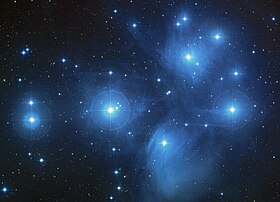Celaeno (star)
| Observation data Epoch J2000 Equinox J2000 | |
|---|---|
| Constellation | Taurus |
| Right ascension | 03h 44m 48.2154s[1] |
| Declination | +24° 17′ 22.093″[1] |
| Apparent magnitude (V) | +5.448 |
| Characteristics | |
| Spectral type | B7IV[2] |
| U−B color index | –0.33[3] |
| B−V color index | –0.046[3] |
| Astrometry | |
| Radial velocity (Rv) | +2.9[4] km/s |
| Proper motion (μ) | RA: 20.73[1] mas/yr Dec.: –44.00[1] mas/yr |
| Parallax (π) | 7.53 ± 1.23 mas[5] |
| Distance | approx. 430 ly (approx. 130 pc) |
| Absolute magnitude (MV) | −0.76[6] |
| Details | |
| Mass | 4.0[6] M☉ |
| Radius | 4.4[7] R☉ |
| Luminosity | 344[6] L☉ |
| Surface gravity (log g) | 3.9[6] cgs |
| Temperature | 12,800[6] K |
| Rotational velocity (v sin i) | 185[8] km/s |
| Other designations | |
| Database references | |
| SIMBAD | data |
Celaeno /səˈliːnoʊ/[10] (designated 16 Tauri) is a star in the constellation of Taurus and a member of the Pleiades open star cluster (M45) of stars.
Properties
[edit]16 Tauri is a blue-white B-type subgiant with an apparent magnitude of +5.45. It is approximately 430 light years from the Sun;[5] about the same distance as the Pleiades. The interstellar extinction of this star is fairly small at 0.05 magnitudes.[11] The projected rotational velocity of the equator is 185 km/s.[8] It is over four times the radius of the Sun and has a surface temperature of 12,800 K.[6][7]
Nomenclature
[edit]16 Tauri is the star's Flamsteed designation.
It bore the traditional named Celaeno (or Celeno) and was called the "Lost Pleiad" by Theon the Younger.[12] Celaeno was one of the Pleiades sisters in Greek mythology. Could be related to kel anus (“black ring”). In 2016, the International Astronomical Union organized a Working Group on Star Names (WGSN)[13] to catalogue and standardize proper names for stars. The WGSN approved the name Celaeno for this star on 21 August 2016 and it is now so entered in the IAU Catalog of Star Names.[14]
Namesake
[edit]USS Celeno (AK-76) was a United States Navy Crater class cargo ship named after the star.
References
[edit]- ^ a b c d Perryman, M. A. C.; et al. (1997), "The Hipparcos Catalogue", Astronomy & Astrophysics, 323: L49 – L52, Bibcode:1997A&A...323L..49P
- ^ Lesh, Janet Rountree (1968). "The Kinematics of the Gould Belt: An Expanding Group?". Astrophysical Journal Supplement. 17: 371. Bibcode:1968ApJS...17..371L. doi:10.1086/190179.
- ^ a b Johnson, H. L.; Morgan, W. W. (1953). "Fundamental stellar photometry for standards of spectral type on the revised system of the Yerkes spectral atlas". Astrophysical Journal. 117: 313–352. Bibcode:1953ApJ...117..313J. doi:10.1086/145697.
- ^ Wilson, Ralph Elmer (1953). "General catalogue of stellar radial velocities". Carnegie Institute Washington D.C. Publication. Carnegie Institution of Washington. Bibcode:1953GCRV..C......0W.
- ^ a b Makarov, Valeri V. (December 2002). "Computing the Parallax of the Pleiades from the Hipparcos Intermediate Astrometry Data: An Alternative Approach". The Astronomical Journal. 124 (6): 3299–3304. Bibcode:2002AJ....124.3299M. doi:10.1086/344683.
- ^ a b c d e f Wolff, Sidney C. (December 1990). "Luminosities, masses, and ages of B-type stars". Astronomical Journal. 100: 1994. Bibcode:1990AJ....100.1994W. doi:10.1086/115654.
- ^ a b Pasinetti-Fracassini, L. E.; Pastori, L.; Covino, S.; Pozzi, A. (November 2000). "Catalogue of Stellar Diameters (CADARS) (Pasinetti-Fracassini+ 2001)". VizieR On-line Data Catalog: II/224. Retrieved 2009-10-10.
- ^ a b Abt, Helmut A.; Levato, Hugo; Grosso, Monica (July 11–17, 2002). "Rotational velocities of B stars". In K. S. Cheng; K. C. Leung; T. P. Li (eds.). Proceedings, Stellar astrophysics - a tribute to Helmut A. Abt. Sixth Pacific Rim Conference. Xi'an, China: Kluwer Academic Publishers. pp. 165–172. ISBN 1-4020-1683-2. Vizier table J/ApJ/573/359.
- ^ "Celeno". SIMBAD. Centre de Données astronomiques de Strasbourg. Retrieved 2009-10-10.
- ^ Davis, George A. (1944). "The pronunciations, derivations, and meanings of a selected list of star names". Popular Astronomy. 52: 8–30. Bibcode:1944PA.....52....8D.
- ^ Breger, M. (August 1984). "The Pleiades cluster. I - Polarization and reddening of the brighter stars". Astronomy and Astrophysics. 137 (1): 145–148. Bibcode:1984A&A...137..145B.
- ^ Allen, Richard Hinckley (1899). Star-names and their meanings. G. E. Stechert. p. 407. Retrieved 2009-10-10.
- ^ IAU Working Group on Star Names (WGSN), International Astronomical Union, retrieved 22 May 2016.
- ^ "IAU Catalog of Star Names". Retrieved 28 July 2016.

